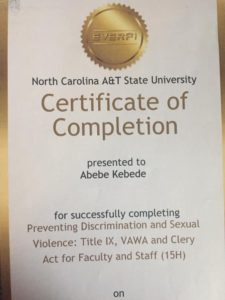Higher Education
Education Commentaries
Professional and Alumni Organizations
Ethiopia is forging ahead with lots of things. A number of Ethiopians are getting PhDs on my side the world. Most trace their lineages to universities and colleges in Ethiopia. There are also hundreds of well established PhDs. Ethiopia should not have issues in getting her people back to do good for her. With this in mind , I like to suggest the following
Field Service
FIELD SERVICE as a cushion while you are looking for a job: If my mathematics helps, I estimate that at least 30000 students graduate from government run Ethiopian universities. Let’s say 20000 of them are absorbed by the various businesses and public service sector, and very few of them go to graduate schools. Now we have 10000 graduates with no work. This can happen because there may be over supply of graduates. The supply can be slowed down by creating a field service program that students in their last year of university career will join the labor force in all sectors. The service lasts for one or two years and by the end of the service, they will have good working experience to help them get the jobs they desire or even better they will be guaranteed jobs. Also the government can put incentive, that every student who signs up for the field service program can have his cost sharing waived. What do you think ? Will this work ? This idea is not new Ethiopia. When I was in elementary school, our teachers were university students. I say bring it back. The value of field service is huge. It promotes cultural understanding and care. Here is a blog on the matter
From Analysis to Action
Ethiopinization of STEM
Please watch this video and evaluate the efforts of the students.
Pedagogy and Ethics Training
Is this equation applicable for pedagogy ?
Pedagogy= methodology+tools+content +assessment
On the right side each component interacts with the other component. Each requires investment and training. I have informal interactions with thousands of students and professors more than anyone in Ethiopia, and I hear things, For example, let’s take content. Content may require computer for data storage, access and software tools. The tools are very expensive and they may not be adequately available on campus computers. They may not be adequate in number, and the user must take turns, We can list hundreds of problems like this ranging from the staff personal life and the hardship he faces in executing his job. I believe for effective pedagogy heavy investment is needed, besides improving the intellectual environment.
About Ethics
What is ethics ? what is being ethical or unethical ?- You can get PhD in Ethics. Share this with your students (https://doctoral.wharton.upenn.edu/ethics-legal-studies/)
On ethics matter, perhaps asking questions and answering them would help.
1) What is considered unethical in Ethiopian education enterprise ?
2) What are the consequences of being unethical ?
3) Do students understand and practice their rights and obligation ?
4) What resources are available for students, staff and administration where they learn about ethics or unethical behavior ?
5) Do the admin, staff and students get periodical training on the matter ?
In education ethics, among other things, includes honest reporting of research, ethical treatment of animals, fair and unbiased treatment of students regardless of their specific identification such as race, sexual orientation, gender and religion.
In my opinion in Ethiopia there are one or two that may be looked at seriously, the first is sexual harassment and sexual assault and the second is discrimination on account of the ethnic identity of the student the academic staff. There must be serious consequences for any unethical behavior and resource must be allocated for training . In many situations people are timid or fearful about discrimination based on sex and ethnic identity. The two affect student learning and they cause permanent damage on the personality of the student, and it is limiting for him to function in society. Studies are needed to answer questions such as
1) Are students/staff prevented from advancing on account of their ethnicity and sex ?
The education road map has alluded to it but not in detail when they are talking about common language. Unfortunately it does not include the state of education for ethnic minorities within the kilil.
2) Are students or staff discriminated to get scholarships or to be selected for an award ? if the answer is yes or it is possible , then you have an ethical criminal environment.
 A few days ago, at my school, we took a comprehensive, a two hour online training on sexual harassment issues, I got a certificate that says I completed the training. by taking the training I signed that I will responsibly report on behaviors or intervene before they happen. it means I am given the responsibility to address the issue, if I don’t do it I can get reprimanded and the law can challenge me as a silent participant- a similar training should be instituted in Ethiopian university campuses.
A few days ago, at my school, we took a comprehensive, a two hour online training on sexual harassment issues, I got a certificate that says I completed the training. by taking the training I signed that I will responsibly report on behaviors or intervene before they happen. it means I am given the responsibility to address the issue, if I don’t do it I can get reprimanded and the law can challenge me as a silent participant- a similar training should be instituted in Ethiopian university campuses.
